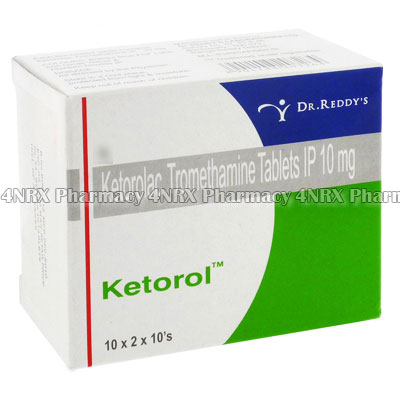 |
Home  General Health General Health  Ketorol (Ketorolac) Ketorol (Ketorolac) |
|
|||||||||
|
|
Ketorol (Ketorolac)
What is Ketorol (Ketorolac) used for? Ketorol (Ketorolac) is an oral nonsteroidal anti-inflammatory drug (NSAID) commonly prescribed for short term pain relief following surgery or other medical procedures. The medication operates by inhibiting immune responses to reduce inflammation, pain, and swelling. Your physician may also prescribe it to treat other conditions that are not listed here. How should I use Ketorol (Ketorolac)? Strictly follow your physician's instructions while using Ketorol (Ketorolac) to get the safest and most effective results from treatment. One tablet is normally administered every four to six hours, but your particular directions will depend on your weight, health, and the severity of your symptoms. These should be swallowed with a full glass of water and can be taken on an empty stomach, but a snack is recommended prior to use if you experience nausea. Avoid lying down within ten minutes of taking the medicine to prevent dizziness or faintness. Do not split or crush the tablets before use as this may destroy or alter the effects of their contents. Ask your physician any questions you have about using the medication to ensure the correct administration. What are the side effects of Ketorol (Ketorolac)? Side effects associated with the use of Ketorol (Ketorolac) include:
More serious side effects that may require immediate medical assistance are chest pain, trouble breathing, sensitive skin, increased bruising, flu symptoms, any sign of mouth sores or skin rash, unusual weight gain, coughing up blood or a substance resembling coffee grounds, seizures, darkened urine, discolored stools, or jaundice. Inform your physician as soon as you encounter any symptoms that are intense or worrying to make sure the correct alterations are made to your regimen to prevent further complications from occurring such as lowered doses or reduced frequency of administration. Please Note Do not begin using Ketorol (Ketorolac) if you are breastfeeding or have a recent head injury, bleeding occurring in the brain, a clotting disorder, stomach ulcer, severe kidney disease, or if you are allergic to other NSAID medications. It is also important to inform your physician if you have polyps in the nose, asthma, heart disease, heart failure, a history of strokes, if you are a smoker, if you have had recent surgery, or if you have liver or kidney disease. These conditions may cause problems during treatment requiring adjustments to your dosage to prevent them from occurring. Strictly follow all instructions provided to you by your physician or pharmacist while using Ketorol (Ketorolac). Optimum and safe dosage can differ based on the patient and the condition being treated. As this medication may be unsafe for certain patients, it is essential you always inform your physician if you are pregnant or breastfeeding, as well as if you have any allergies, other illnesses, or ongoing health conditions, and if you are taking any other form of medication, supplements, or herbal products. Immediately seek emergency medical care if you have an allergic or hypersensitive reaction. Common signs of a reaction include hives, swelling, skin rashes, chest pains, as well as trouble breathing or swallowing. 

|
||||||||||||||||||||||